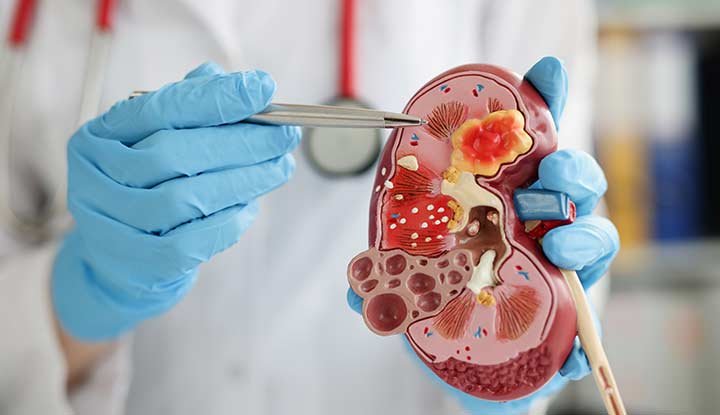Who is Nephrologist?
A nephrologist is an expert on the kidneys. They can do tests to find out what’s wrong and treat kidney-related problems. Internal medicine is the main field of study for nephrology. In today’s blog, we will learn about what does a nephrologist do!

Eligibility
To become a nephrologist, one must:
● Complete an undergraduate and medical degree
● Basic training in internal medicine for three years.
● Finish a two- or three-year fellowship that focuses on nephrology
● Pass an exam given by the board (optional)
Nephrologists usually work on their own or in groups to take care of people who have been sent to them by family doctors or specialists. A lot of nephrologists also work in hospitals and run dialysis units, which are usually in clinics or hospitals.
Some nephrologists also do research in the clinic, while others teach and manage.
A Nephrologist’s Job
A nephrologist is a type of doctor who focuses on treating kidney diseases. Nephrologists are experts in diseases that affect the kidneys and also know how kidney disease or dysfunction can affect other parts of your body.
Your primary care doctor will try to prevent and treat the early stages of kidney disease, but a nephrologist may be needed to help diagnose and treat more serious or complicated chronic disease kidney conditions.
What kinds of diseases do nephrologist treat?
Nephrologists treat conditions that have direct or indirect effects on the kidneys.
Some of the most common problems that a nephrologist treats or helps treat are:
● Kidney disease that is advanced or has been going on for a long time
● Conditions that affect the glomeruli, like glomerulonephritis and nephrotic syndrome
● Diseases of the tubulointerstitial kidneys
● Tubular defects
● Vascular problems with the kidneys, like renal artery stenosis or kidney infections
● Kidney neoplasms, which are abnormal growths; structural or functional problems with the kidney, bladder, or system that collects urine, like nephrolithiasis;
● Blood pressure too high
● Vasculitis
● Autoimmune conditions that affect the kidneys. electrolyte, fluid, and acid-base imbalances or disturbances. some metabolic disorders, like diabetes.
Also Read:- Beer for Kidney Stones – Myths and Facts
The education and training of a nephrologist
Before you can start working toward becoming a nephrologist, you have to finish medical school. Medical school is four years long, and you need a bachelor’s degree to get in.
After you get your medical degree, you will have to do a three-year residency in internal medicine. During a residency, new doctors can get more training and education in a clinical setting and under the watch of more experienced clinicians.
Once you have your certification in internal medicine, you must do a two-year fellowship in the speciality of nephrology. This fellowship helps the required knowledge and clinical skills for the speciality get even better. You can take an exam to become board-certified in nephrology after you finish your fellowship.
What does a kidney doctor do?
Your nephrologist is your kidney doctor. He or she will work with you and your primary care doctor to make a kidney Care Plan based on the stage of your CKD and your specific health needs. This Care Plan will help you and your care team figure out how to take care of your kidneys.
Your kidney doctor can also:
● Helps you maintain kidney health
● Keep a close eye on your lab test results.
● Give suggestions for medicines that might help slow the progression of CKD.
● Work with the people taking care of you.
● Change your care plan if you need to.
● Answer any questions about the health of your kidneys
● Work with other doctors you might see
● Helps you plan for kidney health needs in the future
When to see a kidney doctor
Your primary care doctor can help you avoid getting kidney disease and treat it if you already have it. But in the early stages, you may not have any symptoms or you may have vague symptoms like tiredness, trouble sleeping, and changes in how much you urinate.
Your kidney function can be checked regularly, especially if you are at risk for kidney disease. People who belong to these groups have:
● kidney problems run in the family if someone has high blood pressure, diabetes, heart disease, or both.
Tests can find signs that your kidneys aren’t working as well, like a drop in your GFR or a rise in the amount of albumin in your urine. If your test results show that your kidney function is getting worse quickly or is getting worse over time, your doctor may refer you to a nephrologist.
Your doctor may also send you to a nephrologist if you have any of the following:
● Chronic kidney disease that is very bad
● Large amounts of blood or protein in your urine, though you may also be sent to a urologist for this. Kidney stones keep coming back, even if you’re taking medicine for them. High blood pressure that doesn’t go down even though you’re taking medicine. A rare or genetic cause of kidney disease.
Conclusion
Nephrologists are doctors who focus on problems with the kidneys or that affect them.
Most of the time, they help diagnose, monitor, and treat moderate to severe kidney problems. They can also help people who are at risk of getting kidney problems deal with that risk. A family doctor or doctor in an emergency room will send someone to a nephrologist if they think they might have kidney problems.
How long someone stays under a nephrologist’s care will depend on several things, but the most important is how bad the kidney damage or dysfunction is.



